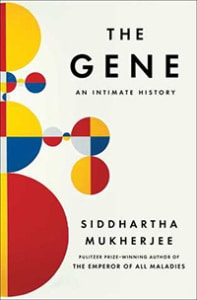The story within us…
Author: Siddhartha Mukherjee
 It may well be the greatest science saga ever told. Featuring a cast of millions – viruses, bacteria, fruit flies, pea plants, worms, rats, inquisitive humans and countless others – the story of the genetic code is an odyssey of billions of years that has been elucidated over the past couple centuries. There may be no one more capable of revealing the full wonder of the story than Siddhartha Mukherjee – oncologist, writer and sage investigator extraordinaire. In The Gene he tells of humankinds continued efforts to unweave the mysteries of life, for both good and evil.
It may well be the greatest science saga ever told. Featuring a cast of millions – viruses, bacteria, fruit flies, pea plants, worms, rats, inquisitive humans and countless others – the story of the genetic code is an odyssey of billions of years that has been elucidated over the past couple centuries. There may be no one more capable of revealing the full wonder of the story than Siddhartha Mukherjee – oncologist, writer and sage investigator extraordinaire. In The Gene he tells of humankinds continued efforts to unweave the mysteries of life, for both good and evil.
Following the raging success of The Emperor of All Maladies – his first book and recipient of a Pulitzer Prize in 2011 – Mukherjee takes on an even more daunting topic than cancer. Starting with Gregor Mendel and his pea plants, he describes the birth of genetics, culminating in the discovery of the structure of DNA by Watson and Crick. While readers may be familiar with many of these stories, the author often manages to provide a fresh spin with some consistently wonderful science writing.
But figuring out the structure of DNA was just a first step in truly understanding how living things actually function. In some of the most interesting parts of the book, Mukherjee reveals how each step of the process – from gene to protein to cell to organism – was illuminated. With remarkable clarity, he manages to make sense of an incredibly complicated web of interacting biological threads.
While following the adventures of a pantheon of scientific giants provides plenty of entertainment, the societal impact of their many discoveries makes up an equally riveting part of the book. From the early 20th century American eugenicists and their drive to improve “racial hygiene” to the evil experiments of Dr. Josef Mengele in the Nazi concentration camps, the powerful have often sought to use genetics to further their own interests.
Mukherjee also ponders the personal aspects of genetics, frequently and poignantly touching on his own family history of profound mental illness. He deftly explores the nature versus nurture debate, revealing much of his clinical wisdom in the process. His descriptions of the many attempts to understand the genetic aspects of sexual orientation and gender identity are particularly fascinating.
Lastly, he brings the story up to the present, with the completion of the Human Genome Project in 2003 and its effects on science, medicine and ethics. As it becomes increasingly easy for humans to genetically modify everything that crosses their path, these issues are only going to become more convoluted and precarious. Taking it one step further, Mukherjee doesn’t hesitate to speculate where the current genomic revolution will take us in the future.
While the above (incomplete) list of topics may seem rather daunting, it turns out to be the stuff of intriguing scientific adventure in the hands of a master like Mukherjee. Displaying a knack for storytelling and a relaxed writing style, he excels at making even the most technical topics easy to read. Rarely do I find a science writer that so consistently has me begging to read more.
How completely can we understand ourselves? Can a structure as beguilingly simple as a DNA molecule encode an organism that can actually decipher itself? Or will the seemingly endless layers of complexity finally stymie us? Mukherjee doesn’t provide answers to questions like these, but if thinking deep scientific thoughts is one of your favorite pastimes, I can’t think of an author that I would recommend more highly. Presenting the full scope of genetics from humble pea plant to fluorescent zebrafish, The Gene is a remarkably entertaining chronicle of one of the great scientific revolutions. Five more stars for the good doctor.
— D. Driftless
human genome photo by Russ London (CC BY-SA 3.0)
Other reviews of books about genetics:
Endless Forms Most Beautiful / The Violinist’s Thumb / The Sports Gene / Life at the Speed of Light
- Best Non-Fiction of 2016 - February 1, 2017
- Little Free Library Series — Savannah - May 22, 2015
- Little Free Library Series — Wyoming - November 30, 2014



